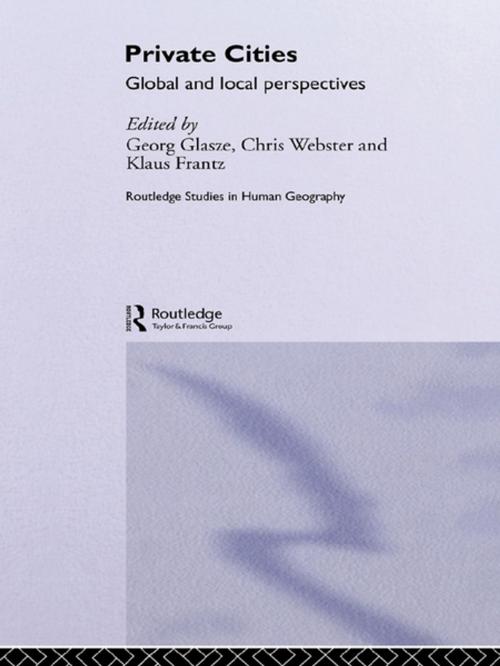Private Cities
Global and Local Perspectives
Nonfiction, Art & Architecture, Architecture, Planning, Science & Nature, Science, Earth Sciences, Geography, Social & Cultural Studies, Social Science, Human Geography| Author: | Georg Glasze, Chris Webster, Klaus Frantz | ISBN: | 9781134294459 |
| Publisher: | Taylor and Francis | Publication: | August 2, 2004 |
| Imprint: | Routledge | Language: | English |
| Author: | Georg Glasze, Chris Webster, Klaus Frantz |
| ISBN: | 9781134294459 |
| Publisher: | Taylor and Francis |
| Publication: | August 2, 2004 |
| Imprint: | Routledge |
| Language: | English |
For the antagonist, private communities are icons of post-consensus, fragmenting civic society, enclosing and excluding by contractual constitution and sometimes by walls and gates. For others they are simply an efficient new way of organizing urban life.
Contributed to, and edited by, an international team of leading authors, this revealing book constructs an interdisciplinary discourse on the global spread of private communities based upon empirical evidence. Case studies from the US, Latin America, the Middle East, Europe and China are used to explore local and global explanations of the phenomenon.
Taking an institutionalist approach, this informative textbook for undergraduates, postgraduates, and researchers alike, develops a model in which cities are shaped by the interplay of local and global processes, and evolve at the interface of spontaneous and planned order. It draws together the various themes, propositions and hypotheses in a way that clarifies the questions by different social science perspectives and that poses researchable questions and new agendas.
For the antagonist, private communities are icons of post-consensus, fragmenting civic society, enclosing and excluding by contractual constitution and sometimes by walls and gates. For others they are simply an efficient new way of organizing urban life.
Contributed to, and edited by, an international team of leading authors, this revealing book constructs an interdisciplinary discourse on the global spread of private communities based upon empirical evidence. Case studies from the US, Latin America, the Middle East, Europe and China are used to explore local and global explanations of the phenomenon.
Taking an institutionalist approach, this informative textbook for undergraduates, postgraduates, and researchers alike, develops a model in which cities are shaped by the interplay of local and global processes, and evolve at the interface of spontaneous and planned order. It draws together the various themes, propositions and hypotheses in a way that clarifies the questions by different social science perspectives and that poses researchable questions and new agendas.















